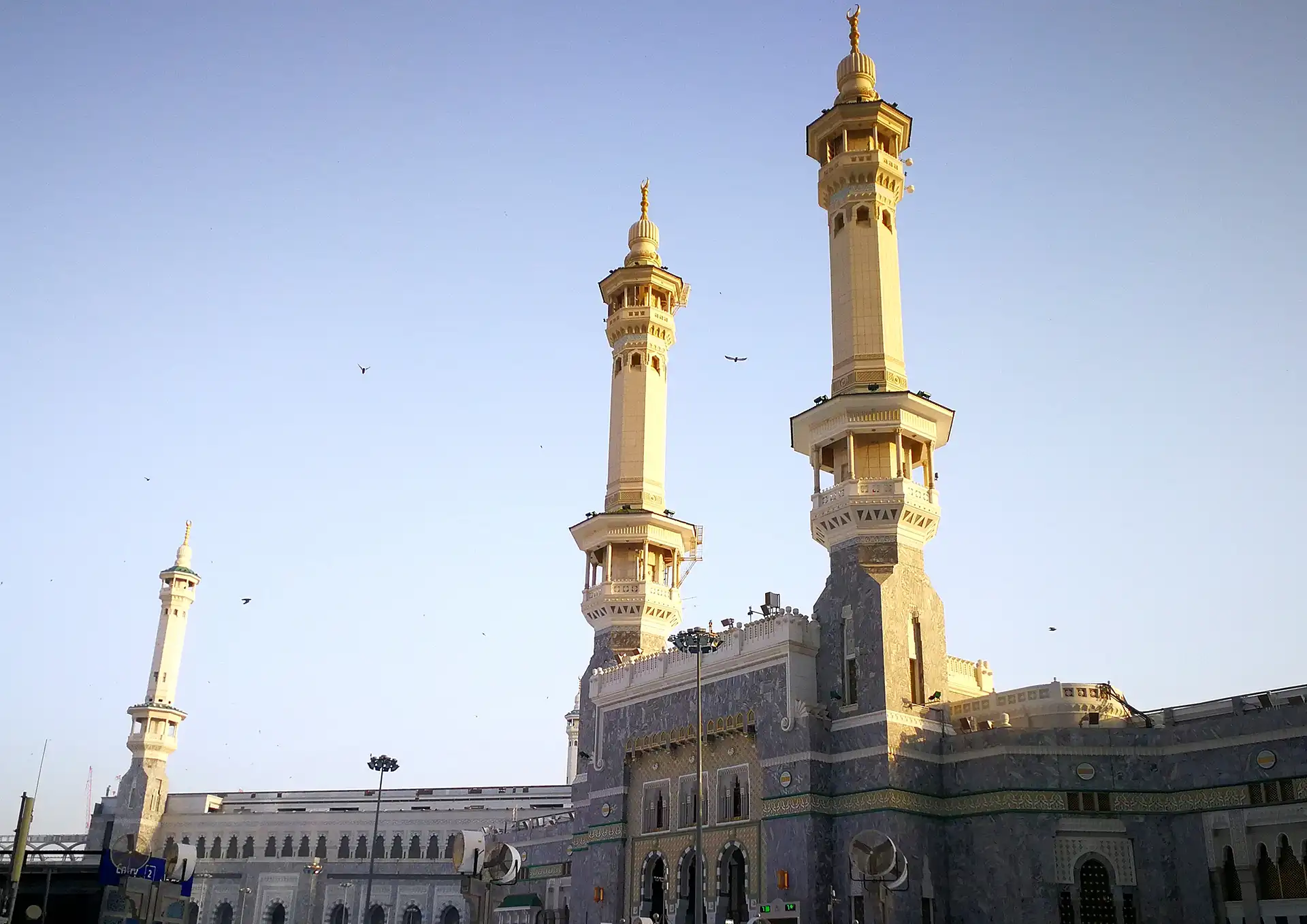- Despite the international tourist and historical interest in the ancient holy city of Mecca, it is, in fact, strictly reserved for Muslims, based on Islamic teachings and Saudi law.
- Many people ask, “Can non-muslims go to Mecca?” and the answer is clear: non-Muslims are not allowed to enter Mecca under any circumstances.
- Verification methods have been put in place over the years to ensure visitors are Muslim, including document checks.
- Medina, the second-holiest city in Islam, has different rules and is partially open to non-Muslims with some restrictions.
Introduction
Mecca, the spiritual heart of Islam, holds a unique place in the minds and hearts of over 1.8 billion Muslims around the world. The sacred city in Saudi Arabia is not just a geographical location but the epicenter of Islamic faith, prayer, and pilgrimage. Every year, millions of Muslims travel from all corners of the world to fulfill one of the most important tenets of their religion: to perform Hajj or Umrah. The pilgrimage to Mecca is especially sacred for Muslims, and performing it at least once is one of the pillars of Islam. The convergence of spiritual devotion in Mecca is unparalleled in both scale and significance.
But Mecca’s allure extends beyond the Muslim world. Many non-Muslims, including academics, historians, and curious travelers, often ask: Can non-Muslims go to Mecca? Or more specifically, can I visit Mecca as a tourist if I’m not of the Islamic faith? In fact, Mecca is not open to travelers like many international cities, and it does have restrictions that are deeply rooted in centuries of tradition and faith.
In this article, we’ll explore the religious reasoning, legal framework, and cultural context behind the rules that restrict access to Mecca. We’ll also answer frequently asked questions and provide guidance for Muslims planning their own pilgrimage. If you’ve ever wondered, “Do you have to be Muslim to go to Mecca?” or thought about what alternatives exist for non-Muslims interested in Islamic heritage, read on.
Why Mecca Is Sacred in Islam
Mecca is not only the birthplace of the Prophet Muhammad, but also the site of the Kaaba, the black cuboid structure located at the center of the Masjid al-Haram, Islam’s most sacred mosque. Every Muslim, no matter where in the world they live, faces this structure during their five daily prayers. Mecca is the starting point of Islam’s historical and spiritual journey.
Two forms of pilgrimage are associated with Mecca:
- Hajj: This pilgrimage takes place annually during the Islamic month of Dhu al-Hijjah. It is one of the Five Pillars of Islam, meaning it is a religious obligation for all Muslims who are physically and financially able to perform it at least once in their lifetime.
- Umrah: Sometimes referred to as the ‘lesser pilgrimage,’ Umrah can be performed at any time of the year (except during the Hajj season). While not obligatory, it is highly recommended and holds great spiritual merit.
These religious rites make Mecca a city that is not just visited but experienced on a deeply spiritual level. The atmosphere, especially during Hajj, is one of unity, submission, and sacred purpose.
Understanding this context is essential when examining who is allowed into the city and why.
Are Non-Muslims Allowed to Enter Mecca?
To clarify upfront: Non-Muslims are not allowed to enter Mecca. The restriction is grounded in Islamic jurisprudence and has been codified into Saudi Arabian law. The prohibition is not a recent development but rather a centuries-old mandate that has always treated Mecca as a sanctified zone exclusively for Muslims.
So when people ask “Can non-Muslims go to Mecca?” or “Can anyone go to Mecca?”, the answer is unequivocally no. Not unless they are a practicing Muslim. The city has many checkpoints, especially along major highways, and access is strictly controlled. Signs in English and Arabic clearly state that non-Muslims must not proceed beyond certain points.
The rule applies irrespective of one’s nationality or purpose of visit. Whether you’re a diplomat, journalist, or tourist, if you’re not a Muslim, you will not be allowed entry.
How Is It Verified That a Visitor to Mecca Is Muslim?
How do they check if you are Muslim in Mecca? Given the high stakes and sensitivity of the matter, the Saudi government employs multiple layers of verification to ensure compliance.
So, how to prove you are Muslim to go to Mecca? Here are the main methods:
- Visa screening: Different types of visas are available for Muslims, including the Hajj visa and Umrah visa. Non-Muslims will not be issued these visas.
- Checkpoint verification: At the entry points to Mecca, authorities may often conduct ID and visa checks to validate religious status.
- Affirmation of faith: In some cases, travelers may be required to affirm their religious beliefs. This is particularly common in ambiguous cases where religious status is unclear.
- Documentation from Islamic authorities: Travelers may be asked to provide proof of Islamic identity from a mosque or religious center in their home country.
These steps are all part of an effort to uphold the religious sanctity of the holy city and prevent any situations in which there is a non-Muslim in Mecca.
What Happens If a Non-Muslim Tries to Enter Mecca?
Attempting to enter Mecca as a non-Muslim is not treated lightly. There are several methods, including checking your birth certificate and other official documents. If you are discovered to be a non-Muslim, the consequences could be quite serious.
- Detention and deportation: Usually, the first thing that takes place is that the individual is detained by the local authorities and deported from Saudi Arabia back to their country of origin. This is not a pleasant experience and could involve financial losses and high-stress situations.
- Fines and legal action: In some cases, significant fines are levied, and the individual may face legal prosecution, like deportation, under Saudi law.
- Travel restrictions: At best, offenders will face issues obtaining a visa to enter Saudi Arabia in the future. But most likely, they will be banned from entering Saudi Arabia in the future.
The existence of these consequences underscores that you have to be Muslim to go to Mecca, and authorities make no exceptions.
Why This Rule Exists: Religious & Cultural Perspective
This restriction is not about exclusion or intolerance. It stems from religious guidelines and cultural practices that have been in place for over 1,400 years.
Here are the main reasons why Mecca bans non-Muslims:
- Spiritual sanctity: The city is considered to be a religiously sacred space rather than an international tourist city.
- Ritual purity: The rituals of Hajj and Umrah involve a level of spiritual preparation and many restrictions and instructions that non-Muslims are not expected to be aware of or follow.
- Preservation of atmosphere: The focus in Mecca is on worship, reflection, and submission to God. Limiting access to Muslims helps preserve this atmosphere.
So, to answer a commonly asked question, “Can a non-Muslim go to Mecca?” The answer is no. Entry is not merely about citizenship or interest; it’s about faith and devotion.
Can Non-Muslims Visit Medina?
There’s often some confusion between Mecca and Medina, and who is allowed to visit these two holy cities. Perhaps surprisingly, non-Muslims can actually visit Medina, but there are limitations.
Medina is home to the Prophet’s Mosque (Masjid al-Nabawi), which houses the tomb of the Prophet Muhammad. While this particular mosque is off-limits to non-Muslims, the city itself does not have the same entry restrictions as Mecca.
Non-Muslims can:
- Visit historical museums and landmarks.
- Stay in hotels and eat at restaurants in the city.
- Learn about Islamic culture and traditions.
This makes Medina a valuable destination for those interested in Islamic history and religious architecture.
What Can Non-Muslims Explore Instead?
While non-Muslims cannot enter Mecca, many alternative destinations within Saudi Arabia offer rich cultural, religious, and historical experiences:
- Diriyah: This is the birthplace of the first Saudi state and a hub of traditional Najdi architecture.
- Jeddah: This is a very cosmopolitan city with access to Red Sea beaches and historic districts like Al-Balad.
- AIUla: Known for its stunning rock formations and archaeological sites, AlUla is also home to the pre-Islamic tombs of Madain Saleh.
- Abha and Asir: These destinations are located in a mountainous region offering a cooler climate, lush landscapes, and a distinct cultural atmosphere.
- Riyadh: The Saudi capital and a tourist attraction where you can explore the city’s heritage in its souqs, museums, and historic architecture with a touch of modernity.
Tourists can access these regions with a standard tourist visa or through the eVisa system, depending on their nationality.
Visiting Mecca as a Muslim: What to Know Before You Go
For Muslims preparing to visit Mecca, whether for Hajj or Umrah, planning is essential. There are several things one can do to make their trip go as smoothly as possible.
Visa Types for Visiting Mecca
- Saudi Tourist eVisa: This visa allows eligible Muslims to perform Umrah outside the designated Hajj season. You can apply for it here.
- Umrah Visa: A specialized visa issued through authorized travel agents.
- Hajj Visa: Issued during the Hajj season, often through a lottery or quota system for each country.
The Saudi Arabia Umrah Visa and Saudi Arabia Hajj Visa are for different purposes; each is applied for separately and comes with unique restrictions.
Preparation Tips for Muslims
- Ensure your documents and passport are valid and meet entry requirements.
- If applicable, get required vaccinations such as meningitis, and consider the encouraged ones like the flu and COVID-19.
- Attend an orientation or training session if offered by your mosque or tour group.
- Learn about the rituals of Hajj and Umrah beforehand and familiarize yourself with the various steps of each.
- Follow local rules and dress codes at all times.
These guidelines help make traveling to Mecca smooth and spiritually fulfilling for any Muslim to visit Mecca properly.
Conclusion
To sum up, the answer to whether non-Muslims can visit Mecca is a clear no. The city remains one of the few places on earth where entry is limited solely based on religious identity. While this may be unusual in a modern globalized world, it reflects a deeply held tradition rooted in faith.
Understanding the reasons behind this rule fosters respect and encourages visitors to explore other parts of Saudi Arabia where they are welcomed. For Muslims, visiting Mecca as a Muslim tourist remains one of the most spiritually uplifting journeys they can undertake.




























































































































































































































